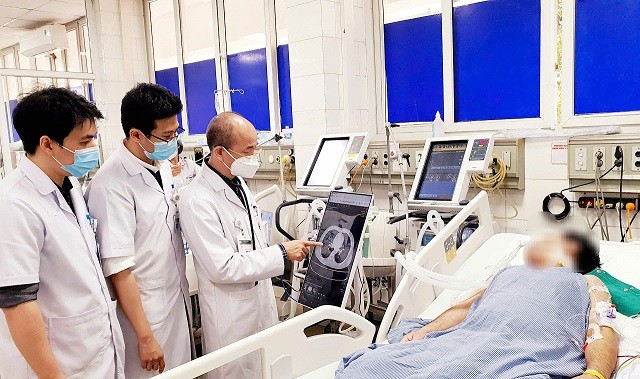The patient was hospitalized with severe lung complications and required dialysis. After 2 weeks of treatment, the patient passed away.
Currently, every day, the Institute of Tropical Medicine receives about 10 to 20 adult patients with measles with symptoms of fever, rash, cough, watery eyes, and runny nose.
Many patients progressed severely with complications of pneumonia, respiratory failure, increased liver enzymes, diarrhea, and even encephalitis and meningitis. Most of them had not been vaccinated or had been vaccinated against measles but had not received a booster shot.
Measles cases are usually between 30 and 50 years old and subjectively do not think they have measles, so when they go to the hospital, the disease is already serious.

Measles is a highly contagious respiratory disease that can easily spread to the community if not controlled. Therefore, when a patient is diagnosed with measles, they need to be immediately isolated for treatment to avoid spreading the disease to other cases.
"Measles cases with complications such as upper respiratory tract infections, pneumonia, increased liver enzymes, liver failure, multiple organ failure requiring dialysis, respiratory failure requiring endotracheal intubation, etc. account for about 5% of hospitalized patients. Cases with underlying diseases such as diabetes and immunodeficiency are at higher risk, easily progressing to severe conditions requiring mechanical intervention," said Associate Professor, Dr. Do Duy Cuong - Director of the Institute of Tropical Medicine.
Many people subjectively think that measles is just a mild disease, which will go away on its own after a few days. However, in reality, the disease can cause dangerous complications if not treated promptly. If you have symptoms of fever, rash, and prolonged cough, you should go to a medical facility for examination and treatment.
Experts also emphasized that measles is not only recorded in children but also in adults, especially those with underlying diseases or weakened immune systems.
Regarding disease prevention, experts say measles is an infectious disease and can be prevented by vaccination. The measles vaccine is included in the Expanded Immunization Program, given to children from 9 months, then given again when the child is 18 months old or 2 years old.
For adults, when the immune system is reduced, a booster shot is also needed. If you have not been vaccinated or do not remember your vaccination history, you need to get a booster shot of the measles-mumps-rubella (MMR) vaccine.
Measles vaccine is a very safe and effective vaccine, the Ministry of Health has recommended that all children should be vaccinated and re-vaccinated. Full vaccination not only helps protect yourself but also helps control the disease in the community.
Therefore, the Ministry of Health has always emphasized the acceleration of measles vaccination to prevent measles and its serious complications.
At the same time, the Ministry of Health requires medical facilities to organize triage and arrange separate examination areas for people suspected of having measles and people with measles. At the same time, implement diverse communication measures (such as through loudspeakers, posters, leaflets, websites, fanpages, etc., direct instructions) so that patients, relatives of patients, medical staff, students, and pupils clearly understand measles and measures to prevent and control measles, and the effectiveness of measles vaccination.
Organize guidance and recommendations for family members of patients, people suspected of having measles, and people with measles to apply measures to reduce the spread of the disease such as wearing masks, covering mouths when sneezing, etc.
Source: https://baolaocai.vn/da-ghi-nhan-ca-tu-vong-soi-o-nguoi-lon-dau-tien-trong-nam-post399977.html



![[Photo] Prime Minister Pham Minh Chinh and Prime Minister of the Kingdom of Thailand Paetongtarn Shinawatra attend the Vietnam-Thailand Business Forum 2025](https://vphoto.vietnam.vn/thumb/1200x675/vietnam/resource/IMAGE/2025/5/16/1cdfce54d25c48a68ae6fb9204f2171a)























![[Photo] President Luong Cuong receives Prime Minister of the Kingdom of Thailand Paetongtarn Shinawatra](https://vphoto.vietnam.vn/thumb/1200x675/vietnam/resource/IMAGE/2025/5/16/52c73b27198a4e12bd6a903d1c218846)






























































Comment (0)